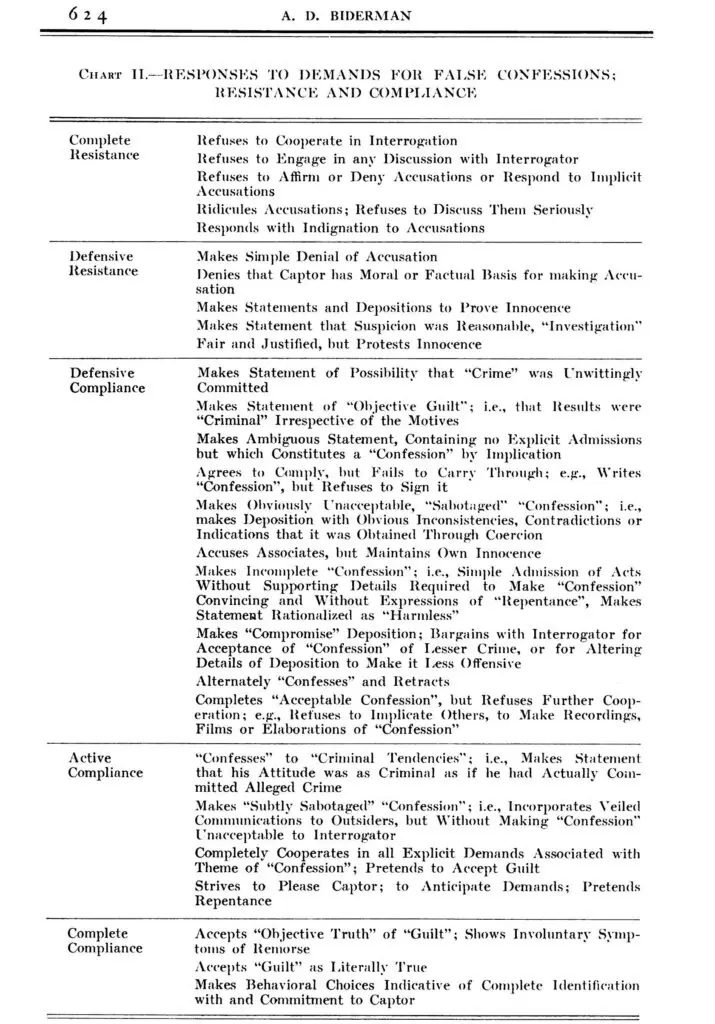People with Narcissistic Personality Disorder are very controlling with the people around them. They can be jealous and possessive. They will often use coercive techniques in their control of others, this is defined as an offence in British law introduced in 2015 to mean:
“An act or a pattern of acts of assault, threats, humiliation and intimidation or other abuse that is used to harm, punish, or frighten a victim.”
“Controlling behaviour is a range of acts designed to make a person subordinate and/or dependent by isolating them from sources of support, exploiting their resources and capacities for personal gain, depriving them of the means needed for independence, resistance and escape and regulating their everyday behaviour.”
Below is Biderman’s Chart of Coercion. It was written by Dr. Alfred D. Biderman M.A., who was a social scientist. He studied brainwashing techniques of communist governments on American prisoners of war and in 1956 he published a report on this which can be found here.

Coercive Control
Coercive control is abusive as it is manipulative, threatening, seeks to dominate others and subjugate them to one’s own will. It results in its victims ‘walking on eggshells’ around the perpetrator. The narcissist wishes to control others as part of their disorder. It is not love, although possessiveness and jealousy can be mistaken for love by those from dysfunctional backgrounds. Drivers for their behaviours can be insecurity and fear of the loss of particular people who are ‘supply‘ for them. Other people exist in a narcissist’s life to reinforce their image of themselves and if mirroring from the environment is inadequate then the false grandiose self will feel frustrated and the underlying anger and depression will start to emerge. By controlling and micromanaging those around them, the narcissist hopes to control their inner world of terrifying emotions.
Narcissists are not always consciously aware of the reasons for some of their behaviours as the triggers and reactions are kept out of their conscious awareness but they are usually aware of which behaviours are acceptable or not as they will behave in certain ways in front of different people.
Romantic relationships between a narcissist and another will begin in the idealisation phase and for a while can often seem like the perfect relationship. This then deteriorates over time as the coercive techniques seep in as a means of control. The narcissist’s underlying jealousy and disapproval of their partner being independent can mean that their partner becomes isolated from friends and family.
My Way or the Highway
The narcissist’s need to control can mean that their partner must buy into their way of thinking as it is ‘my way or the highway,’ which means, their way of perceiving the world and what they want dominates their partner’s way. A narcissist projects their subconscious loathing of themselves and the shame they feel onto their partner and they then devalue their partner in many ways through insults and degradation. Their partner will be explicitly or implicitly aware of the underlying threat of abandonment which creates an atmosphere of anxiety. A person with NPD is often chaotic and badly organised in their thought processes. They will use the primitive defence of denial (the refusal to accept reality or fact, acting as if a painful event, thought or feeling did not exist which is characteristic of early childhood development).
This can be destabilising for their partner who often does not understand what is happening and may easily doubt their own perceptions (as it is likely they have come from a narcissistic family and will be familiar with this scenario).
Blatant Lies
Narcissists will also ‘gaslight’ their partners with blatant lies. They seek to win at all costs.

The Big Lie
Biderman notes that although there were some cases of those who were unable to withstand the coercion, in almost all cases, resistance was the dominant ingredient. He ends his report with this:
“The mystery associated with the things I have discussed stems not from their rationality but from their irrationality. Unlike the cynical Nazis who merely perpetrated the Big Lie, the Chinese Communist personnel whom our prisoners encountered in Korea were required to live the Big Lie“.
Such is life with a narcissist. The people around them are required to live the Big Lie.









This Post Has 5 Comments
Thank you for this article. My fathers wife abused me horribly and she also abused my father. I’ve been reading up on narcissistic abusers and coercive control. This really describes Vicki and now I understand more of what was done to me.
Hi Jossi,
Thank you and I am glad you have more understanding.
There are now emerging narcissist personalities in most positions of leadership. Principals, management, supervisors , directors ,doctors, etc.
Yes, some stats are; 6.2% of general population have NPD, 17% of first year medical students and 20% of military personnel:
https://childrenofnarcissists.org.uk/narcissistic-personality-disorder-statistics/
Many people in management and leadership roles will also have this.
You may be interested in this article which speaks about narcissistic behaviours being laid out as directives to destroy political opponents in Germany after the second world war:
https://childrenofnarcissists.org.uk/zersetzung-gaslighting/
My sons were brought up with a narcissistic father. They are 40 and 38 now. For 6 years since I left their father after a 50-year marriage, my sons have not spoken to me. I have had no contact by phone, email, text or any other means. They all ignore my contact. This also means I have not had contact with my grandchildren, who are 5 children the oldest being 10. My children were well brought up, attended private schools, and one is a pilot, while the other holds degrees from a Private University. All of this cost a great deal of money, which I paid for willingly at the time. My husband did not work in a way that produced income.
Now, in my senior years, I have very little income and no family support. The worst part is they appear to enjoy being cruel. Is there anything I can do? Coercive control is about to be made a crime in the state of Australia, where one of them lives. The other son lives overseas. They both earn large salaries because of the investment I made in them. I am so weary of the pain this has caused me. Wendy R